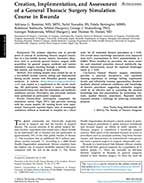The ‘Spark’ That Led to Online General and Thoracic Surgery Education
Numerous programs exist where physicians and healthcare staff travel to the developing world to treat patients and conduct surgical procedures. However, these visits often only last a week or two, and the medical experts return to their home countries with the equipment and the knowledge. As a result, there often is no sustainability of these efforts.
The founder of General & Thoracic Simulation Surgery Education for Developing Countries, Dr. Thomas Daniel, Professor Emeritus of Surgery at the University of Virginia School of Medicine, was selected as an instructor in 2013 for a program developed by the Ministry of Health in Rwanda, Africa.
This program, known as the Human Resources for Health (HRH) Program, was funded by a grant from the U.S. Center for Disease Control and started in 2012. It was a seven-year program whose goal was to accelerate the speed and quality of healthcare education in Rwanda by recruiting healthcare professionals from first world countries to come to Rwanda and teach for an extended length of time.
These doctors, nurses, midwives and hospital administrators came to Rwanda for periods of three months to a year or more. This length of stay allowed time to develop local relationships and to teach their Rwandan faculty counterparts. By teaching the teachers the program would have a sustained effect.
As Dr. Daniel prepared for his first trip to Rwanda in 2013, one fact kept going through his mind – “there is not a single trained thoracic surgeon in the entire country.” So, in addition to teaching general surgical procedures, he decided to introduce physicians in Rwanda to thoracic surgery. But he also wanted to create a sustainable teaching model that would continue long after he left the country.
This idea served as the spark for what is now an online General and Thoracic Surgery Education course focusing on six general surgery and four thoracic procedures — that would normally take months to see and learn. The online course can be combined with a hands-on simulation surgery workshop as part of a blended learning model.
A one-day course in simulation surgery does not replace the intense training of surgeons in the developed world, but it does provide residents in the developing world with a head start at experiencing surgery.
According to Dr. Daniel, surgery is not just a cognitive process about knowledge and anatomy that can be taught through textbooks alone. A surgeon-in-training needs to experience how their hands or instruments feel when applied to different tissue. Surgery also requires hand-eye coordination, as well as the judgment and skill that come with practice and repetition.
“Simulation breaks the ice and provides the experience of having an experienced teacher directly walk you through a case,” says Dr. Daniel. “Simulation accelerates the learning process by creating environments where you can practice procedures and can afford to make mistakes, learn how to be captain of a team, and use assistants wisely.”
Aside from saving time, the online course reduces costs by not having to purchase textbooks and enables students to study and prepare prior to in-person simulation.
“Simulation surgery is the wave of the future,” says Dr. Daniel, “and I’m thrilled to launch this unique venture of blended learning, teaching general and thoracic surgery by combining an online course with a hands-on simulation surgery workshop.”
 Download the article “Creation, Implementation, and Assessment of a General Thoracic Surgery Simulation Course in Rwanda” (pdf) published in June 2018 issue of the Annals of Thoracic Surgery by The Society of Thoracic Surgeons. Vol. 105, Issue 6, p1842–1849.
Download the article “Creation, Implementation, and Assessment of a General Thoracic Surgery Simulation Course in Rwanda” (pdf) published in June 2018 issue of the Annals of Thoracic Surgery by The Society of Thoracic Surgeons. Vol. 105, Issue 6, p1842–1849.
This article was presented at the Sixty-fourth Annual Meeting of the Southern Thoracic Surgical Association, San Antonio, Texas, November 8–11, 2017.